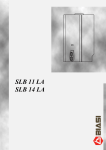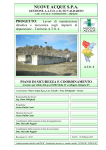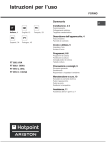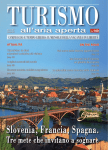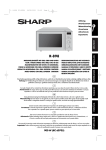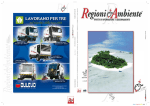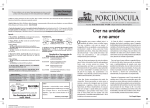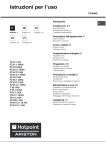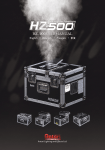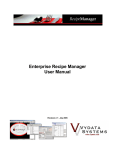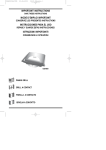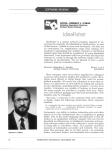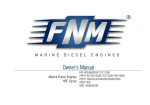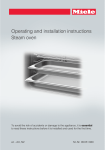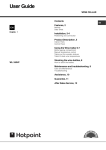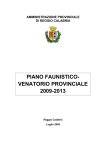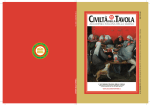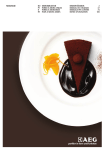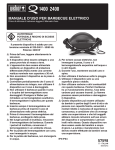Download La Casetta - a User`s Manual
Transcript
La Casetta
San Cristoforo
A user’s manual
2015
www.sancristoforo.info
House notes
Shopping & banks
Beaches & swimming
Medical
Opening times
Transport & directions
Eating out
Menu translator
50 ways to pass the time
History of San Cristoforo
Walk this way
2 to 5
6 to 8
9
10
10
11 to 12
13 to 14
15 to 16
17 to 18
19 to 20
21
HOUSE NOTES
BOOKS & MUSIC
You are welcome to borrow books and CDs from our large library – just ask when you
want to browse. There is a CD player in La Casetta; if you bring your iPod/iPad or
other device, we can provide you with a cable link to the stereo system.
BREAKAGES & THINGS THAT DON’T WORK
If anything breaks during your stay, please let us know as soon as possible so that we
can replace it speedily for you. Please also tell us if light bulbs go, drains block or
anything else doesn’t work so we can put it right.
CLEANING
If you are staying for more than a week, we will change your bed linen and towels at a
time which suits you. You might like to know that we use a range of organic, fairtrade, low-allergy (seriously!) cleaning products in La Casetta.
COFFEE MOKA MACHINE
The “moka” espresso coffee pot is easy to use. It unscrews into three parts. Fill the
lowest part with water up to the safety valve. Drop the coffee container in and fill it
with coffee without pressing it down. Then screw the top back on and put on a low
flame. As the water boils it is forced up through the coffee into the upper pot. When
you hear a marked gurgling sound, the coffee is ready and should immediately be
taken off the flame. Two things not to do with the machine: never wash it with
washing-up liquid; like a teapot it should just be rinsed in water, and don’t bang the
coffee holder to get used grounds out - if it distorts, it won’t work anymore.
ELECTRIC IRON
We can let you have one (+ board) should you really feel the need to use it.
ELECTRICITY
Power, as in UK, is 220V/50AC. As with many country homes, our supply is limited.
This means that if, say, the grill, the water pump and an electric iron are on at the
same time, the power might cut out.
If the power does fail, you'll need to tell us, or check in two places if we’re not around.
Firstly, look at the electricity meter in the grey electricity box at the foot of the path up
to the main house. If the switch is on “O” then push it in to “I”. If you find that the
switch is already on “I”, then check the fuse boxes next to the meter - occasionally,
one of the trip switches cuts out, especially during a thunder storm. If any of the
switches are in the middle position (i.e. neither up nor down) then all you have to do is
push the switch down, then up to the top again. If the switches are all pointing
upwards then the problem is probably external and it is just a matter of waiting for the
power to come back on. You should find a supply of candles in the cottage for these
rare eventualities.
GARDEN
We will need to water the garden and pots on the terrace from time to time during the
summer months and hope that it will not inconvenience you. You will find sun
loungers and cushions for the swing chair in the store-room by the terrace. If you
want a barbecue just ask us.
HEATING AND COOLING
In winter the central heating system is controlled by two thermostats: downstairs in
the sitting room and upstairs in the twin-bedded room. Should you feel chilly in spring
or autumn months, you are welcome to light a fire. We will happily supply you with
logs, kindling and scout-style training in how to light it. Both bedrooms have goodquality, quiet running ceiling fans for the few really hot weeks of the year.
INSECTS
As we live in the countryside insects are all part of life’s bounty; however, San
Cristoforo is relatively free of mosquitoes and the bedroom and bathroom windows of
La Casetta have insect screens. Ask us for a plug-in mosquito repellent if you have
trouble.
INTERNET
There is free wireless broadband in La Casetta. Our 2 MB connection is fine most of
the time, but we usually disconnect the router if there is any threat of a thunder storm.
We also ask guests not you use it for such bandwidth guzzlers as streaming video,
gaming or file-sharing.
KITCHEN
We have left some basic ingredients and condiments for your arrival - coffee, tea,
sugar, salt, pepper, vinegar and extra virgin olive oil and ask that guests keep these
replenished as they run out. If you need small quantities of other ingredients that are
not worth you buying in any quantity – nutmeg, flour, for example – do ask us. There
are plenty of different herbs growing around San Cristoforo – depending on season,
we usually have rosemary, sage, thyme, marjoram, basil, bay and chives, with fennel
and mint growing wild. Feel free to ask us if you need to borrow any particular piece
of kitchen equipment.
LAVATORIES
Please do not flush anything down the bowl other than human waste and
parsimonious amounts of loo paper. Sewage is treated by septic tanks which easily
become fouled up. Chemical lavatory cleaners, acids and antibiotics should be
avoided at all costs as they inhibit the workings of the tanks. Excessive use of toilet
paper may block up the system and cause problems for the next guests, if not for you.
Please be economical and use the bidet as much as possible.
MAPS
The most useful road map of the area is the Touring Club Italiano “Umbria Marche”
sheet at 1:200,000 or the equivalent sheet from Michelin. We can lend you more
detailed maps for walking in the nearby mountains.
PARKING
The region’s antique towns were never built for cars and you will find that some
historic centres are now closed to unauthorized traffic - do not pass beyond signs with
a red circle on a white background. Sometimes this restriction is limited to certain
days or hours which will be marked on the sign (for example, weekends or market
days). Otherwise, park in designated parking spaces: spaces drawn with blue lines
mean you need to pay at the nearby ticket machine and display the ticket in your
windscreen; yellow-lined spaces are usually for disabled drivers or permit holders,
and spaces drawn in white lines are free parking.
Where signs indicate a time limit you will have to set a disco orario with your time of
arrival; you can buy the disc from most newsagents and garages. In a hire car there
should be one in the glove compartment or already stuck on the windscreen.
PAYMENT
We would be grateful if you could settle up with us in good time before leaving. You
can pay the balance due in Euro either in cash, by Visa, MasterCard, Maestro or
Amex credit or debit card (you’ll need your PIN), or by bank transfer (the best way if
you have a Euro zone bank account).
PETS
We have two cats, Fred and Ginger, and ask guests to try not to feed them.
Unfortunately we are not able to play host to guests with their own dogs or cats.
RECYCLING & RUBBISH
There is no door-to-door rubbish collection in this part of the world. Please take your
general rubbish, glass, paper, tins and plastic to the various bins at the side of the
road on the way into Cagli. The large, plain green bins are for non-recyclable waste
while the smaller containers marked “vetro” are for glass. Paper and plastics bins are
the red and yellow ones marked “carta” and “plastica” and tins go in the white bins
marked “lattine”. Ask us if you have any problems finding bins. You can put organic
waste in the plastic bucket on your terrace which we put in our compost bin.
TELEPHONE
If you need to contact us when we are not at home our mobile numbers are (+39) 339
2411737 (Peter) or (+39) 333 8159921 (Richard).
You are welcome to give our telephone number (+39 0721 790215 from abroad /
0721 790215 within Italy) to family, friends and work colleagues in case they need to
contact you in an emergency.
Mobile phone users will find a good signal at San Cristoforo for TIM (Telecom Italia
Mobile), Italy’s largest network. Bear in mind that the thick walls in the cottage can
weaken the signal in some points.
WATER
Our water comes from our own spring near the house. Regular analysis shows that it
is bacteriologically and chemically sound. Nevertheless, we have installed a
purification plant, with reverse osmosis, activated charcoal filters and UV treatment, in
the kitchen to provide you with high-quality drinking water. Please use this sparingly
as it comes from a somewhat costly system that can only produce around 10 litres
per day; please don’t use it for washing up, cooking pasta, etc..
WASHING MACHINE
You are free to use the washing machine in the main house. Please ask us, and we
will show you how to use it and give you detergent.
WHEN YOU LEAVE
It is probable that there will be new guests arriving on the day of your departure. In
order to prepare for them, we would be grateful if you would depart before 10.00 am.
If you have a late departure, please feel free to leave your cases here to collect later;
you are welcome to use our own bathroom if you need to before leaving.
Don’t be shy in telling us how you think we might improve what we offer. Our website
is at www.sancristoforo.info. We’re always pleased, too, when guests leave feedback
on websites such as www.sawdays.co.uk or www.tripadvisor.com.
SHOPPING & MORE
BANKS
There are some five banks with 24/7 ATMs in Cagli. If you have a credit or debit card
you will find these the easiest way to get money. Banks are open from 8.30 until
13.30 and from 15.00 to 16.00 Monday to Friday only – they are closed on Saturday.
BREAD
Traditional local bread - pane comune - is unsalted and many guests, used to salted
bread, find it tasteless. Conad (see below) sells ciabatta and pane pugliese both
salted; if you want wholemeal bread ask for pane integrale - Alimentare sell a
particularly good integrale. Remember that shops sell out of bread quickly and by the
afternoon there is often little choice. In emergencies you can buy packaged, sliced
white bread called pan carré which makes passable toast but is otherwise inedible.
CREDIT CARDS
Most larger shops and restaurants in Cagli take them. Down by the coast and in
larger towns they are even more widely accepted. Petrol stations all take them.
ITALIAN LANGUAGE
The advantage of coming to this part of Italy is that you will bump into fewer foreign
tourists. The disadvantage is that locals are less likely to speak good English. A few
words of Italian help enormously.
In any event, you will find the people of this area very patient and friendly, and shop
keepers anxious to understand what you are looking for. As in every country in the
world, words like "Good morning" (buongiorno), "please" (per favore/per piacere) and
"thank you" (grazie) will help you a long way. In SHOPPING below, you’ll find a list of
useful words for buying food.
MARKET DAYS
Here are the nearest weekly morning markets:
Cagli – Wednesday; Pergola – Saturday; Acqualagna & Cantiano – Thursday;
Gubbio – Tuesday; Urbino & Fano - Saturday
Note that parking is not easy on market days and may require a longish walk.
PRESENTS
If you are looking for presents to buy, here are a few suggestions:
Pottery – Brightly-painted majolica ware is found in large quantities in Gubbio, and to
a lesser extent in Urbino. When decorated well it can be charming but can otherwise
be somewhat kitsch. Alternatively, the pottery at Barchi sells attractive terracotta
ware.
Prodotti Tipici - There is a smart "speciality" shop in Cagli called Alimentare; you'll
find it at the side of the town hall in via Leopardi. They sell excellent olive oil,
cheeses, salami, real balsamic vinegar, the best regional wines, and chocolates.
Honey - Local honey is one of the area's specialities and includes the produce from
our own hives. In local food shops look for honey from “Catria e Nerone” produced by
“Fausto Feligioni” who looks after our hives.
SHOPPING
Conad is a well-stocked supermarket that is open daily, even at lunchtime, and also
on Sunday mornings; you will see its distinctive black glass building just outside Cagli
on the left heading in the Fano direction.
Opening hours for all other shops are generally from 8.30 am to 1pm and from 4.30
until 7.30pm. All food shops, except the above Conad, close on Thursday afternoon,
while non-food shops tend to be closed on Monday mornings.
In most of the town’s supermarkets, the food is on the shelves for you to help
yourself, except for the delicatessen counter, where you also need to ask for bread.
When ordering from the counter, most things are sold in units of etti (un'etto/due etti)
one etto = 100 grams, or slightly less than a quarter pound. For small quantities it is
common to use a half etto (un mezz'etto). The following wordlist may be of use (see
also our menu & shopping translator in this manual):
cheese - formaggio
- pecorino (nostrano)- ewe’s milk cheese (local)
- parmigiano (gratuggiato) - parmesan cheese (freshly grated)
milk (full/semi-skimmed) - latte (intero/parzialmente scremato)
fresh cream - panna fresca (there is no “single” or “double cream” - all panna fresca is
halfway between the two and only just whips up thick with a lot of work. If you want
cream to go with a dessert use mascarpone cream cheese.
bread - pane (bought by the half kilo or kilo (mezzo kilo/un kilo)
"parma" ham - prosciutto crudo
cooked ham - prosciutto cotto
olives - olive
The best shop for fruit & vegetables is the friendly vegetable shop on the right just
before the roundabout on the way to Cagli, which stocks depending on season:
apples - mele
aubergine - melanzane
bananas - banane
broad beans - fave
courgettes - zucchine
cucumber - cetriolo
fennel - finocchio
french beans - fagiolini
garlic - aglio
lemons - limoni
lettuce - insalata
melon - melone
nectarine - pesche noce
onions - cipolle
oranges - arance
peaches - pesche
peas - piselli
peppers - peperoni
potatoes - patate
rocket - rucola
tomatoes - pomodori
water melon cocomero or anguria
At the butcher's shop you'll find:
beef - manzo
chicken - pollo
lamb - agnello
liver - fegato
pork - maiale
rabbit - coniglio
steak (beef/pork) - bistecca (di
manzo/di maiale)
sausages (excellent) - salsicce
turkey - tacchino
mince (lean) - carne macinata (prima
scelta)
WINE
The vegetable shop mentioned above has the best stock of cheap local wine, either in
ordinary bottles or five-litre flagons. If you want to try the best Marche wines, or
indeed the best Italian wines, Alimentare (the smart little shop/bar at the side of the
Town Hall) has an outstanding collection of the region's most important labels.
Otherwise Conad sells popular if rather industrial Italian wines.
The region’s best known wine is white Verdicchio available in two types, Verdicchio
dei Castelli di Jesi, and Verdicchio di Matelica; the latter is rarer but often rather
better. The most celebrated red is Rosso Conero which ranges from fairly cheap and
cheerful versions up to some of the region’s most expensive bottles at around 25
Euro a go. Rosso Piceno is another commonly found Marche red - go for the
superiore version if you can. The local white is Bianchello del Metauro, a light,
highly drinkable wine - good producers include Guerrini, Fiorini, San Liberio and
Umani Ronchi; local reds include Rosso dei Colli Pesarese (again Fiorini and
Guerrini make good versions), Lacrima di Morro d’Alba - a delicious perfumed red
from the little town of Morro d’Alba - and Vernaccia from Pergola. Also from Pergola
is Visner or Vino di Visciole, a wonderful sweet digestivo made from visciole, or wild
sour cherries, macerated in red wine.
If you want any assistance in buying wine do ask us.
BEACHES & SWIMMING
The closest beaches are at Fano (35 minutes drive). Try the northern end of the town
(towards Pesaro) where the beaches are sandy rather than pebbly. There are also a
number of small but friendly beaches on the road between Fano and Pesaro where
you can wave at the passing trains.
If you want to try a little further afield, drive southwards to the Conero Riviera, just
south of Ancona, the most beautiful coastline along this stretch of the Adriatic. It takes
about an hour and a half by car. In July and August, though, it gets very crowded.
However, we think it is hard to beat Cagli's own rocky riverside swimming holes. You
will find them between Cagli and Cantiano on the old via Flaminia and also in the
direction of Secchiano.
Gran Canyon, as it is known locally, lies on the road towards Secchiano. Leave Cagli
on the road which passes the Torrione and drive for about 4 km. Passing a small
roadside chapel on the left, park on the right hand verge a further 500m on, just after
the end of the crash barrier. Here there is a long, narrow channel for swimming and
rocks for paddling. Further downstream, clamber down over the rocks to explore the
Gran Canyon itself, a microscopic version of its Arizona counterpart but extremely
beautiful.
You’ll notice a rather undistinguished bar/pizzeria which lies along the old via
Flaminia, about 4 km S of Cagli opposite a large stone quarry. About 400m before
you arrive there, there are shallow rock pools and flat bathing areas, as well as a
large, deep rock pool and an overhanging promontory for diving.
Note that most of these places require a certain amount of scrambling down slopes
and so are not ideal for less able guests. They are, also, not swimmable after heavy
rain, and usually only really inviting in July and August.
MEDICAL
DOCTORS AND DENTISTS
If you have medical or dental problems during your stay we can put you in contact
with a local doctor and dentist. European Union guests can claim back the cost of
treatment but this is not always easy; unless treatment is going to be costly, it is much
simpler and not expensive to see the doctor as a paying private patient.
Cagli hospital has an excellent 24-hour casualty department - look for the red Primo
Intervento sign by the first set of traffic lights as you arrive from Fano. A number of
our guests have had minor problems solved there without difficulty.
PHARMACIES
There are two pharmacies in Cagli one in the main square and one just off by the
Duomo - between them they run a duty pharmacist rota with Sunday and holiday
opening.
EMERGENCIES
In emergencies dial 112 for the police, 115 for the fire brigade or 118 for an
ambulance. These numbers must clearly only be used in a real emergency.
OPENING TIMES
Pergola - Bronzi Dorati:
10.00 - 12.30 and 15.30 - 18.30 (closed
Mondays)
July & August: 10.00 - 12.30 and 5.30 19.00 (open every day)
Fonte Avellana Monastery:
Guided tours inside the monastery
Monday to Saturday on the hour:
10.00 - 11.00 - 15.00 - 16.00 - 17.00
Sunday and feast days every 30
minutes from
10,30 to 12,00 and 15,00 to 17,30
Urbino - Palazzo Ducale
Mondays: 8.30 - 14.00 (last entry at
12.30)
From Tuesday to Sunday: 8.30 - 19.15
(last entry at 18.00)
Closed: Christmas & New Year’s Day
Casa Raffaello (Urbino)
From 1 November to 28 February:
Monday to Saturday: 09.00 - 14.00;
Sunday and holidays: 10.00 - 13.00
From 1 March to 31 October:
Monday to Saturday: 09.00 - 13.00 and
15.00 - 19.00; Sunday and holidays:
10.00 - 13.00
Closed: Christmas & New Year’s Day
Oratorio of San Giovanni (Urbino)
Winter: every day from 10.00 to 13.00
Summer: weekdays: 10.00 - 12.30 and
15.00 - 17.30 holidays: 10.00 - 12.30
Closed: Christmas & New Year’s Day
TRANSPORT AND DIRECTIONS
Guests should be aware that a car is essential at San Cristoforo although our own
town of Cagli is only 5 kilometres, or 3 miles, away.
BUSES
There is a daily service to Rome which might tempt you. It leaves Cagli at 7.00am,
arriving in Rome at 10.30. It leaves Rome at 5.45p.m, bringing you back to Cagli at
around 9pm. This leaves you with a rather brief 7 hours to see the sights of one of the
world's most historic cities. Alternatively, you might feel tempted to stay for a night
and come back the following day.
Other bus services to and from Cagli connect local towns and tend only to coincide
with school hours.
CAR
Remember you must have your driving licence, insurance and car registration
documents with you when you’re driving - spot checks are common. Italian law also
requires you to keep your dipped headlights on during daylight while driving on all
main roads, and to wear a fluorescent waistcoat if you get out of your car when
broken down on a main road.
Diesel (gasolio) and LPG (GPL in Italian) are both freely available in the area and
there is a methane (metano) station at Acqualagna. Although petrol stations are
closed for a long lunch break and all day Sunday, you can buy petrol - as long as you
have some crisp Euro notes - from the 24-hour machines in the forecourt of both
petrol stations in Cagli.
RAILWAY STATIONS
The nearest station on the Milano-Bari main east coast line is Fano, though some
faster trains only stop at nearby Pesaro. For trains on the Ancona-Rome line (see
also Buses above), drive to Fossato di Vico, near Fabriano (45 minutes south of Cagli
along the via Flaminia). Full Italian train timetables in English are available on
www.trenitalia.com .
DIRECTIONS BY CAR TO SAN CRISTOFORO
If coming from the north or south, take the A14 autostrada (toll motorway) on the
Adriatic coast. Exit at FANO and follow signs for ROMA and AREZZO onto the dualcarriageway. Just after the town of FOSSOMBRONE, the road divides. Do not take
the turning for Urbino, but bear right on the slip road, following signs for ROMA and
AREZZO. You soon pass through a 3-km tunnel that by-passes the Furlo Gorge.
Leave the main road at the CAGLI EST exit and follow the road for a couple of
kilometres, skirting the old town to your right, as far as the town's only traffic lights
(actually there is another set just before, by the hospital, but they don't really count).
At the lights turn left over the bridge following signs for PERGOLA.
11
(Coming from Tuscany or Umbria to the east, navigate your way to GUBBIO, then
follow the signs for FANO and the SS.3. Having climbed up the hill and back down
keep following signs for FANO. As you approach Cagli, take the exit marked SAN
GERONZIO and CAGLI; turn right at the bottom of the slip road and follow the road
as it skirts the edge of Cagli until you reach the traffic lights, where you turn right over
the bridge.)
Having turned at the traffic lights and crossed the bridge, follow the main road through
the modern part of town, straight on at the roundabout and back into open
countryside. At the next roundabout take the second exit for PERGOLA.
After about 4 km from the traffic lights, the road leaves the flat plain (look out for the
bar/restaurant Le Fontane on your right at end of this straight stretch of road), and
twists down into a river valley, over a small bridge, and rises up again.
Now take the first left turn, right on the brow of the valley. Watch out for traffic on this
blind corner - there is a mirror on your left to help check for oncoming traffic. You will
see San Cristoforo on its small hillock to the left of you - take the first left turn,
immediately after our small abandoned cemetery. Ben arrivati!
For a more precise way of finding your way look out for the kilometre markers on the
left-hand side of the road as you come from Cagli - these mark each kilometre in
descending order with smaller signs marking each 100 metres using Roman
numerals. Our turning is after the 50 kilometre sign and immediately after the 50 km
200 metre smaller one. If all this sounds incomprehensible the picture below shows
the junction with the sign to look out for as an inset:
If you are using GPS, you may find that “strada Santa Barbara” is not listed: the coordinates for San Cristoforo are: North: 43o 32' 48" East: 12o 42' 23"
12
EATING OUT
Here are a few of our suggestions - do tell us about your own restaurant discoveries.
Note that smoking is prohibited in all restaurants and bars unless they have a
separate room for smokers or an outdoor eating area. Few of these places require
booking in advance – those that do are mentioned below.
The nearest place is Le Fontane (closed Mon), the restaurant on the left on the road
from San Cristoforo towards Cagli - a feasible walk on a warm evening. It has an
attractive terrace and a wide menu. It also has a wood-oven producing good pizza in
the evenings.
Alternatively, a short drive up to Frontone, the village with the medieval castle that
you can see directly in front of San Cristoforo, gives you a choice of a number of
restaurants. Down below in the modern part of town - Hotel Daino (closed Mon)
looks uninviting from outside but is well-known for its traditional local cookery. Good
wine list, reasonable prices and attentive service. Best of all is the grilled kid, or
capretto for secondi; maybe avoid the antipasti. Otherwise up by the castle La
Taverna della Rocca (closed Weds), built in the old stables, serves authentic local
food, - essentially a choice of primi and a good selection of meats grilled on the large
fire in front of you (around €20 per head). Nearby is the equally good if marginally
less atmospheric Amabile (closed Mon).
Cagli itself has a limited choice of places, other than anonymous pizzerie. La
Gioconda (closed Mon, booking advised at weekends), in an attractive cellar just off
the street between the piazza and the oval Torrione, with a creative take on local
cooking served with a flourish at fair prices is listed by Michelin. A good and cheap
choice is Il Poggio (closed Mon), renowned for its spaghetti alla carbonara – you’ll
find it signed off to your left on your way to Cagli.
Alimentare (closed Sun), the little specialist deli and wine shop (see Shopping
section) also has a simple but imaginative lunchtime menu, and excellent plates of
mixed salumi and/or cheese; you can sit at one of the few outdoor tables in summer.
In the centre of Acqualagna, just off the main square, Osteria del Parco (closed
Tues) serves hearty traditional food at modest prices and has a large garden.
Just before you arrive at the Furlo Gorge from the direction of Cagli, a good lunchtime
snack place is the Abbadia di San Vincenzo (open daily in summer). This outdoor
kiosk sells piadina (the local flat bread) filled with prosciutto, cheese or erba cotta
(cooked greens). Further along the gorge is the Ristorante Antico Furlo - wonderful
food from celebrated local chef Alberto Melagrana, but high prices; some guests find
it great for a special meal, others find it overpriced.
13
If you’re in Cantiano try Ristorante Tenetra (closed Mon) near the traffic lights better than average local cooking, some rarely found traditional dishes, and fair
prices.
For fish, there are endless possibilities along the coast, particularly at Fano and
Pesaro – note that nearly all fish restaurants close on Mondays. For a budget piscine
lunch, try the self-service Pesce Azzurro at Fano. The set-price menu (last year €13)
gives you a no-choice four-course lunch - cooked by a fishermen's co-operative - plus
a quarter bottle of wine - a bargain though the noise can be a bit off-putting. You'll find
the restaurant on the sea front, between the Sassonia Beach and the fishing port. A
few doors up is Da Quinta, one of Fano’s oldest and most traditional trattorie serving
fish.
For the grandest fish meal of all try Uliassi (closed Mon, booking suggested) close to
the port at Senigallia; reckoned one of Italy's top restaurants, not too fussy, brilliant
but relaxed service and right on the beach. Seriously expensive but worth it - around
€140 per head including wine - and what you’d expect from two Michelin stars.
If you’re going to Gubbio the best-known restaurant in town is Taverna del Lupo
(closed Mon) – excellent traditional Umbrian fare but at rather higher prices (but then
you are in Umbria rather than the Marche).
There are a host of places in Urbino but nothing that really stands out. We often make
for Tre Piante (closed Mon) on the edge of town but really just for the pretty summer
terrace, and Taverna degli Artisti (closed Tues) just up from the botanic gardens
and with a frescoed dining room, both everyday places with reasonable prices.
Opposite the entrance to the Palazzo Ducale is Il Cortegiano which has both light
snacks and a proper restaurant, and an appealing outdoor courtyard in summer.
14
OUR MENU & FOOD SHOPPING TRANSLATOR
Items with an asterisk are Le Marche specialities
aceto - vinegar
affettato - sliced cured pork meats
aglio - garlic
*agnello - lamb
anatra - duck
anguilla - eel
antipasto - hors d'ouvres
arrabbiata - spicy ("angry") pasta sauce
arrosto - roast
asparaghi - asparagus
*baccala' - salt cod
basilico - basil
in bianco - "white" ie. dish without
tomato
bietola - chard
bistecca (maiale/manzo) - steak (pork/
beef)
bollito - boiled
alla brace - cooked over embers
braciola - chop, usually of pork
branzino - sea bass
*brodetto - Marche fish stew
in brodo - in broth
bruschetta - toasted bread with oil &
garlic
burro - butter
*cacciagione - game
alla cacciatore - with sweet pepper and
tomato
calamari - squid
*cappelletti (in brodo) - "hats" of stuffed
pasta (in broth)
carciofi - artichokes
carne - meat
carote - carrots
carpa - carp
castagne - chestnut
*castrato - older, stronger tasting lamb
cavolfiore - cauliflower
cavolo (nero) - cabbage (dark)
ceci - chick peas
cetriolo - cucumber
*ciauscolo - soft cured pork salame
ciliege - cherries
*cinghiale - wild boar
cipolla - onion
*coniglio (in porchetta) - rabbit (stuffed
with wild fennel)
contorno - vegetable dishes
*coratella d’agnello - tasty fry-up of
lamb’s insides
costarelle - spare ribs
cotto - cooked
cotechino - excellent boiled sausage
cozze - mussels
crostini - toasted canapes
crudo - raw
dolci - sweets
fagiano - pheasant
fagioli - beans
fagiolini - french beans
faraona - guinea fowl
farcito - stuffed
fave - broad beans
*fegatelli - pig's liver wrapped in caul
fat
fegatini - chicken livers
fegato - liver
fettina - thinly sliced meat
fettuccine - pasta ribbons
fichi - figs
filetto - fillet
finocchio - fennel
focaccia - flat bread
formaggio - cheese
*formaggio di fossa - strong, cavernaged cheese
fragole - strawberries
frittata - omelette
fritto - fried
frutta - fruit
frutti di mare - shell fish
funghi - mushrooms
gamberi - prawns
gelato - ice cream
gnocchi - small potato dumplings
15
alla graticola/griglia - grilled
insalata (verde/mista) - salad
(green/mixed)
in umido - stewed
involtini - stuffed meat rolls
lenticchie - lentils
lepre - hare
*lonza - cured fillet of pork
luccio - pike
*lumache - snails
macedonia di frutta - fruit salad
magro - lean
maiale - pig/pork
mandorle - almonds
manzo - beef
marmellata - jam
mela - apple
melanzane - aubergines
merluzzo - cod
miele - honey
minestra - soup
minestrone - vegetable soup
misto - mixed
nocciole - hazelnuts
noce - walnut
nostrano, nostrale - locally produced
oca - goose
olio d'oliva - olive oil
orata - gilt-head bream
osso buco - shin of veal
ostriche - oysters
pane - bread
panforte - dried fruit spiced cake
panino - roll
panna - cream
panzanella - bread & tomato salad
pappardelle - wide pasta noodles
*passatelli - a pasta made of
breadcrumbs & cheese
patate - potatoes
penne - pasta quills
peperoni - peppers
peperonata - braised peppers and
tomato
pesce - fish
pescespada - sword fish
*piccione (ripieno) - pigeon (stuffed)
piselli - peas
pollo - chicken
polpette - meatballs
pomodoro - tomato
*porcini - boletus mushrooms (cepes)
prosciutto (crudo) - ham (raw cured
“Parma”)
ragu' - meat sauce
ripieno - stuffed/stuffing
riso - rice
rombo - turbot or brill
in rosso - cooked with tomato
*salame di fichi - figs pressed into
salame shape.
salsiccia - sausage
*seppie (con piselli) - octopus (with
peas)
sogliola - sole
sott'olio - food preserved under oil
spezzatino - meat stew
allo spiedo - grilled on skewers
spinaci - spinach
*stoccafisso - salt cod (see baccala’ )
tacchino - turkey
tartufo/tartufato - truffle/flavoured with
truffles
tiramisu - sweet with eggs, sponge and
mascarpone cheese
tonno - tuna
tortellini - stuffed pasta rings
triglia - red mullet
trippa - tripe
trota - trout
uovo - eggs
verdura (cotta) - green vegetables
(cooked)
*vincisgrassi - Marche version of
lasagne
vitello - calf or veal
vongole - baby clams
zucchini - courgettes
16
Fifty ways to pass the time at San Cristoforo
1. See some of Europe’s most dramatic caves at the Grotte di Frasassi
2. Discover that Rimini isn’t all sun n’sand package tourists - the old centre boasts
Roman remains, one of Italy’s most celebrated Renaissance buildings and the
chicest designer stores.
3. Feast on snails at the annual snail festival in June at Pianello near Cagli
4. Swim in the bracing mountain torrents at Cagli in the July & August heat.
5. Join Italian families on the beach at Fano and wave at the trains as they pass.
6. Spot the portrait of the young Raphael in the splendid fresco by his father Giovanni
Santi in Cagli’s San Domenico church.
7. Walk the mountain meadows above San Cristoforo with a handbook to alpine flora
in May or June when the wild flowers dare you to step on them.
8. Buy smart shoes at low prices at Cagli’s Wednesday market - the Marche region
makes a large part of Italy’s shoes so it’s a good place to pick up bargains.
9. Pick up knock-down fashion at the Union Moda factory outlet shop near Fano.
10. Go downmarket at the Auchan hypermarket at Fano.
11. Look perplexed at Piero della Francesca’s Flagellation - described by Sir Kenneth
Clarke as the world’s greatest small painting - in Urbino’s Palazzo Ducale
12. Thrill to the works of the master of bel canto at the Rossini Opera Festival at Pesaro
in August having booked tickets a long time ahead.
13. Eat piadina - the local flat bread - filled with prosciutto, cheese or salami in the
grounds of the medieval abbey of San Vincenzo in the nearby Furlo Gorge.
14. Follow a pilgrim's trail of the works of Piero della Francesca from the Uffizi in
Florence to see his famous twin portraits of Federico da Montefeltro and Battista
Sforza, Arezzo for his great fresco cycle of The Legend of the Cross, Monterchi for
the Madonna del Parto, Sansepolcro for his Resurrection, and Urbino for the
Flagellation of Christ and the Madonna of Senigallia.
15. Visit a handful of central Marche towns to see some of the best paintings by
Lorenzo Lotto see www.le-marche.com/Marche/html/lotto.htm for more.
16. Find fascinating hardware and kitchen equipment at Mellifi hardware store in nearby
Urbania.
17. Break out the watercolours and try to render the magnificent views from the terrace.
18. Explore the relics of ancient Rome that lie along the route of the via Flaminia
through Cagli, one of Rome’s oldest great roads.
19. Visit the truffle festival - one of Italy’s biggest - at the end of October and beginning
of November at Acqualagna near Cagli
20. Pick the growing tips of Clematis vitalba - old man’s beard - in early May to use to
make a memorable omelette.
21. Experience the more contemplative side of Roman Catholicism at the venerable
monastery of Fonte Avellana on the flanks of Monte Catria.
22. Drive to the peak of nearby Monte Catria and see if you can see the Croatian coast
on the other side of the Adriatic - you’ll need to walk the last 20 minutes.
23. Avoid the Republic of San Marino and visit its “twin peak” across the valley, San
Leo - not a republic but a very striking fortified town.
24. Stay up late at an outdoor bar table in Cagli’s main square - you can make one or
two drinks last the whole evening.
25. Try some of Italy’s best ice cream at Ghignoni near Sanseplocro - see
www.ghignoni.it for more.
26. See a striking collection of massive canvasses by the 20th C painter Alberto Burri in
former tobacco drying sheds at Città di Castello.
17
27. Join the pilgrims at Loreto to visit the Holy House - one of the most important of
Europe’s many Marian shrines.
28. Light a candle at the tomb of the patron saint of ecologists as well as Italy’s patrono,
Saint Francis of Assisi. Admirers of the pre-Christian era should also visit the
remains of the Roman forum right underneath the town’s central square.
29. Borrow a sugar thermometer and some jars from us and make jam from the
excellent local fruit.
30. Switch off all the lights and gaze into the amazing night starscape (and millions of
years back into the past).
31. Sup artisan beer from nearby Apecchio, la città della birra.
32. Take the chair-lift up nearby Monte Acuto and mountain-bike your way back down.
33. Admire some of the world’s greatest mosaics at Ravenna, just over two hours drive
away.
34. Count the number of dogs in the renaissance Salimbeni brothers’ frescoes at the
Oratorio di San Giovanni Battista in Urbino.
35. Buy attractive terracotta pottery at the village of Barchi.
36. See why the town of Jesi is known as the Milan of the Marche.
37. Hear great voices under the stars at the Macerata open air opera festival
38. Sunbathe or fly a kite on the green meadows on the top of Monte Petrano way
above Cagli; in late spring daffodils carpet the place.
39. Try and catch a glimpse of the golden eagles either on Monte Catria or in the
nearby Furlo Gorge.
40. Take the bus from Cagli to Rome - it takes some three hrs 30 mins each way.
41. Go and ponder the KT boundary just outside nearby Gubbio – for the geologists.
42. Browse designer sunglasses at the smart local optician’s.
43. Witness the annual Good Friday procession of Cristo Morto at Cagli - 200 barefooted and hooded “penitents” carrying a baroque catafalque with the Dead Christ
through the streets; moving or scary (or maybe both) depending on your viewpoint.
44. Go clubbing at Rimini - Italy’s nightclub capital.
45. See the Bronzi Dorati at Pergola - celebrated gilded bronze Roman equestrian
statues.
46. Eat ripe figs in late August/early September straight from one of our four fig trees.
47. Take a picnic up to the meadows of nearby Monte Catria.
48. Have a barbecue in the La Casetta garden without worrying about smoking out the
neighbours.
49. Take a gentle stroll on the circular walk through our woods.
50. Visit the Conero peninsula just south of Ancona for limestone cliffs and pretty
coves, with some that can only be reached by boat.
18
A VERY SHORT HISTORY OF SAN CRISTOFORO
The Isola, or “Island”, of San Cristoforo stands above the confluence of two torrents –
the Screbbia and the Savino – and thus provided a naturally secure and easilydefended site for some of the earliest inhabitants of the area. Worked flint tools,
probably dating back to Late Stone Age times, have been found in the field above the
steep slopes of the torrents, although no formal archaeological investigation has so far
been carried out in the area.
More concrete evidence of early settlers was unearthed in 1934 when the then parish
priest, Don Biagio Paoletti, discovered three tombs furnished with black glazed
Etruscan-style ceramics dating from the 3rd Century BC. The grave goods were
photographed (see below) but nothing is known of their whereabouts.
Fifty years earlier another tomb was found in a nearby cornfield containing an amphora
and two oil lambs, but no further details of this find have come to light.
The earliest written records referring to San Cristoforo are tithe accounts dating from
around 1290, and suggest an already lengthy history. It appears to have taken its name
from a fortification that earlier stood on the site.
It seems that the priest lived on the site of the original church until Don Orazio Nucci
(1565-1588) built a new canonica, or presbytery, on the current site of San Cristoforo.
The old church, however, remained in use until 1727 when the then parish priest, Don
Angelo Amatori, built the present church at the side of the presbytery. In his description
of the sacristy of the new chapel, Don Angelo refers to “a washbowl in stone cut and
decorated by myself” which is still in place in what is now the bedroom of La Pieve.
A report by Monsignor Cosci during a pastoral visit in 1743 described how the floor of
the old church had been removed revealing human remains in varying states of
decomposition. He ordered their removal and gave permission for the church to be
demolished and the stone to be put to other uses; it is probable that some of the stone
for La Casetta came from the old church.
The last priest to live at San Cristoforo was Don Biagio Paoletti. After his death in 1942,
the chapel was served by the priest from the nearby parish of Sant’ Angelo in Maiano.
19
The last mass was celebrated around 1970. The small church school at San Cristoforo
was also closed in the 1970s.
Richard Dixon and Peter Greene bought San Cristoforo in 1988 and over the next 16
years carried out the slow restoration of the whole complex.
The chapel in 1988
20
A local walk to Frontone – around 1hr 30mins. Beware of mud if it has rained recently.
21





















